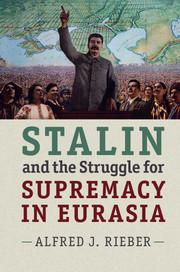Crossref Citations
This Book has been
cited by the following publications. This list is generated based on data provided by Crossref.
Wohlforth, William C.
and
Zubok, Vladislav M.
2017.
An abiding antagonism: realism, idealism and the mirage of western–Russian partnership after the Cold War.
International Politics,
Vol. 54,
Issue. 4,
p.
405.
Sperling, Walter
and
Lefranc, Alban
2017.
Grozny : réinventer une « petite Union soviétique » dans le Caucase.
Le Mouvement Social,
Vol. n° 260,
Issue. 3,
p.
71.
Agosti, Aldo
2017.
Riempire le «pagine bianche». Nuovi interrogativi e nuove risposte sulla rivoluzione russa.
PASSATO E PRESENTE,
p.
19.
2018.
The Soviet Union.
p.
145.
Musgrave, Leone
2019.
Mountain Alternatives in Eurasia’s Age of Revolution: North Caucasia’s ‘National Indifference’, Anticolonial Islam, and ‘Greater War’, 1917–18.
Revolutionary Russia,
Vol. 32,
Issue. 1,
p.
59.
Markwick, Roger D.
2019.
War, Violence and the Making of the Stalinist State: A Tillyian Analysis.
Europe-Asia Studies,
Vol. 71,
Issue. 6,
p.
907.
Dudaiti, Аlbert K.
2021.
Problems of Iran’s relations with the leading world Powers in the initial period of the Second World War (1939–1941).
Vestnik of North-Ossetian State University,
p.
12.
Yenen, Alp
2021.
Internationalism, Diplomacy and the Revolutionary Origins of the Middle East's ‘Northern Tier’.
Contemporary European History,
Vol. 30,
Issue. 4,
p.
497.
Whitewood, Peter
2021.
In the shadow of the war: Bolshevik perceptions of Polish subversive and military threats to the Soviet Union, 1920–32.
Journal of Strategic Studies,
Vol. 44,
Issue. 5,
p.
661.
Palko, Olena
2022.
“Poles of the World Unite”: The Transnational History of the 1929 World Congress of Poles Abroad in the Context of Interwar Soviet–Polish Rivalries.
Nationalities Papers,
Vol. 50,
Issue. 6,
p.
1143.
Falkov, Yaacov
2022.
Intelligence-exalting strategic cultures: a case study of the Russian approach.
Intelligence and National Security,
Vol. 37,
Issue. 1,
p.
90.





